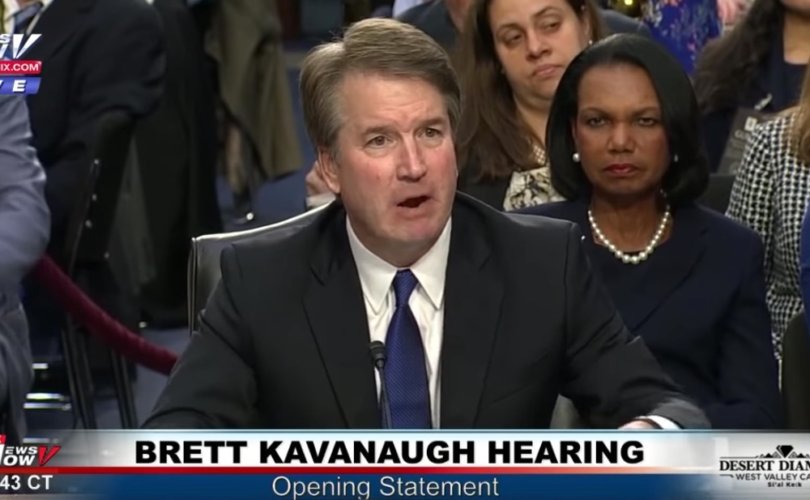WASHINGTON, D.C., September 7, 2018 (LifeSiteNews) – Amid multiple ambiguous statements on abortion, same-sex “marriage” is the next issue on which Brett Kavanaugh’s testimony to become the next Supreme Court Justice raised more questions than answers Thursday.
On Thursday, the District of Columbia circuit judge’s second day of questions from the Senate Judiciary Committee, Democrats attempted to pin him down on Obergefell v. Hodges, the 2015 ruling that forced all fifty states to recognize same-sex “marriages.” He refused to reveal his position, but made a series of troubling references in the process.
Using Kavanaugh’s repeated praise of the 1954 segregation case Brown v. Board of Education as a springboard, Sen. Kamala Harris, D-CA, asked if he similarly believed Obergefell was “one of the great moments in the history of the Supreme Court.”
Kavanaugh refused to answer, citing the example of previous Supreme Court nominees. “The vast swath of modern case law, as Justice Kagan put it, you can’t as a nominee in this seat give a thumbs-up or thumbs-down,” he said. “That’s her words.”
Harris repeatedly pressured him for an answer, though, leading Kavanaugh to quote what he called a “very important statement” from the author of Obergefell’s majority opinion, the pro-gay jurist Kavanaugh has been nominated to replace.
“Justice Kennedy wrote the majority opinion saying the days of treating gay and lesbian Americans, or gay and lesbian couples, as second-class citizens inferior in dignity and worth are over in the Supreme Court,” Kavanaugh said.
Sen. Cory Booker, D-NJ, used his opportunity first to elicit a general agreement from Kavanaugh that he hires his own staffers based solely on their qualifications, then to ask if there is a “legal right to fire someone just because they’re gay, in your opinion?”
“Senator, the question, as I’m sure you’re aware, of the scope of employment discrimination law is being litigated right now,” Kavanaugh replied. “And therefore while I’d like to talk to you about this more, because that issue is in a variety of cases right now, it would be inconsistent.” Booker tried a second time, only for the judge to reiterate his non-response.
Shifting gears, Booker then asked about Kavanaugh’s time in the Bush administration, specifically whether he had any role in or thoughts on former President George W. Bush’s support for a constitutional amendment specifying that marriage is between one man and one woman.
“As staff secretary, things related to that, speeches he gave would’ve crossed my desk, as I’ve expressed before,” he answered, though he did not recall whether he expressed an opinion to others in the White House. He also answered that he had never officiated a same-sex “wedding” (unlike Justice Ruth Bader Ginsburg).
However, despite his professed unwillingness to forecast his judgment, Kavanaugh hinted that even if he had expressed an opinion, it would be unlikely to reflect his current views.
“There’s been a sea change in attitudes in the United States of America even since 2004 as you’re well aware,” he said. “I’ll tell you that there was debate in the White House, Vice President [Dick] Cheney came out, one of the few times he publicly came out and disagreed with” Bush. Now the “law of the land protects that right as dictated by the Supreme Court.”
During a response to a question about whether he had been involved in anti-LGBT “discrimination” efforts at the time, Kavanaugh also told Sen. Dianne Feinstein, D-CA, that while working for Bush he spoke “on occasion to the Log Cabin Republicans, which was a group that we, that I talked to about judicial nominations, as I recall. And President Bush is someone who as he said believed deeply in…equality for all Americans.”
Log Cabin Republicans (LCR) is a group dedicated to diluting and eventually eliminating the GOP’s traditional conservative stances on marriage, homosexuality, and transgender ideology. LCR executive director Gregory Angelo wrote last month that Kavanaugh met in 2003 “with a group of over 200 gay men as part of a Log Cabin Republicans event at the Eisenhower Executive Office Building.”
Kavanaugh’s testimony is unlikely to reassure the pro-family advocates already concerned by his unclear abortion testimony. This week he has expressed significant respect for Roe v. Wade’s status as precedent under the doctrine of stare decisis. Pro-life supporters and pro-abortion foes alike argue that his answers are merely phrased to navigate a narrowly-divided Senate.
The strongest evidence for pro-life leanings is a 2017 speech he gave on his “first judicial hero,” the late Chief Justice William Rehnquist. He approvingly cited Rehnquist’s judgment that a right to abortion was not “rooted in the traditions and conscience of our people,” and that Roe was an example of “freewheeling judicial creation of unenumerated rights.”
Interested readers can follow the Senate Judiciary Committee’s third day of confirmation hearings in real time with PBS's live video and SCOTUSBlog’s live blog of highlights.

